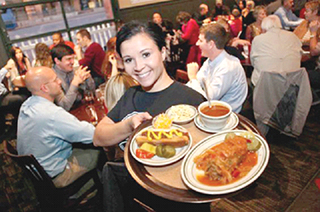Kota Kinabalu: The days of some employers in the hospitality industry meeting the minimum wage requirement by using part or all of the service charge accrued from customers to top up the salaries of these workers are over.Under the Minimum Wage Order 2016, employers need to pay staff in Sabah, Sarawak and Labuan, RM920, excluding elements of service charge as opposed to the now revoked Minimum Wage Order 2012. Sabah Hotel Association President Christopher Chan said while its members have done adjustments over the way they charge customers in these areas, the impact of the new minimum wage may affect restaurant operators which impose such charges.
ADVERTISEMENT
"The concern is how they will fare on the new minimum wage. But most of my members have made adjustments according to existing laws to cope with the new minimum wage," he said. Chan did not say whether they have abolished service charge altogether, but pointed out the refinement of service charge collection was made due to the non-existence of a common Collective Agreement among members. The definition of hospitality industry encompasses a broad category of fields that includes lodging, event planning, theme parks, transportation, cruise liner, and additional fields within the tourism industry and this involves smaller units of multiple groups such as maintenance and direct operations ranging from waiters, housekeepers, porters, kitchen workers, bartenders, management, marketing, and human resources and others. Sabah Hotel Employees Union leader Ladis Yaman previously raised questions as to whether these employers are shortchanging workers, noting that the outlets were not supposed to pocket the collection of service charge.
ADVERTISEMENT
An existing term of a Collective Agreement for unionised hotel workers at a five-star hotel in Tanjung Aru stipulates that the hotel operator is only allowed to collect 10 per cent of monies to cover operational cost such as damage to utensils and training of manpower. The remaining 90 per cent Ladis said: "Goes to the workers equally according to their service points (an exchange unit to the service charge collection)."
ADVERTISEMENT
Ladis pointed out without the CA no outlets could impose the service charge, noting the first CA was drawn up in 2008 with the revision made every three years, thereon. But a legal battle waged by the National Union of Hotel, Bar and Restaurant Workers aims to ensure employees are paid a clean minimum wage without the use of service charge to make up the numbers. Currently there are a several cases pending in the Industrial Court. The implementation of the minimum wage 2016 has made it clear that the collection of service charge should not be used to top up to meet the new salary cap. In Sabah there are as many as 5,000 people employed in star-rated hotels and restaurants across the State, with regulator estimates that more than 90 per cent of them are locals. Previously, their salaries ranged from RM250 to RM350 a month, prior to the implementation of the minimum wage in 2012. Employees relied on the service points for additional income, largely perceived from the collection of service charge imposed by their operators or employers. How much is collected from the service charge has always been kept a secret by most operators, with the exception of hotels that actually signed CAs, Ladis pointed out. "Every month the amount of collection is made known to all the workers at this hotel and workers would be able to know the valuation of each of their service points."Some of the workers could earn more than RM3,000 a month and were able to buy a brand new car," he said. The service charge element has existed in the industry for about 50 years, and was introduced as a form of tips to the workers who had direct or indirect contact with their guests. In 2012, hotel operators fought tooth and nail over the minimum wage implementation, with many claiming a higher salary will burden operational costs and, thus, allowed hotel operators to top up the amount from the service charge and re-scheme them as employees' wages. The move resulted in operators cutting down on the service points or abolishing the service point mechanism for good, but retained a service charge collection on customers' bills. The issue of service charge collection has surfaced many times over the years including when the implementation of the Goods and Services Tax was made on April 1 last year. Deputy Chief Minister cum Industrial Development Minister Datuk Seri Raymond Tan pointed out the practice of some operators of pocketing the service charge collection was unfair in view of the tourism industry having a RM3 billion annual valuation. Stay up-to-date by following Daily Express’s Telegram channel.
Daily Express Malaysia




